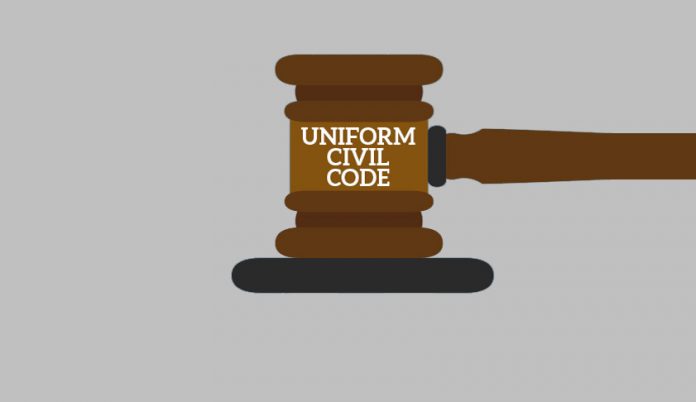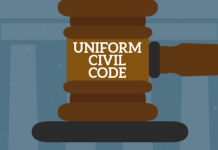This article is written by Varchaswa Dubey from the School of Law, JECRC University, Jaipur. This article is a reflection of exhaustive research conducted to provide particulars of the Uniform Civil Code with issues revolving around it and the solutions.
Table of Contents
Introduction
The Uniform Civil Code (UCC) is a vision to contribute to a uniformly structured legislature that will reserve all the aspects revolving around the personal religious and civil laws of every religion in India. The UCC will grant uniform personal laws to every religion to attain secularism and will override personal laws of different religions, races, caste, etc.
The practices it includes are the uniformity in-laws of marriage, divorce, succession, adoption, guardianship, and partition of land and assets to all citizens without any discrimination. The other aspect of proposing UCC is to protect the rights of women of different religions in India.
Origins of Uniform Civil Code
The origins of UCC can be traced back to Colonial rule in India where during the year 1840, a uniform law was enacted by the British for crimes, evidence, and annexures, while personal laws of Hindus and Muslims were deliberately left unattended, resulting in much inconsistency and complexity among both religions.
After gaining independence from the British, during the constituent assembly debates, the founding fathers of the constitution like Dr. B.R. Ambedkar recommended a uniform civil code to be included initially in Article 35 of the Constitution of India, 1949 and personal laws must be kept out of the ambit of UCC however he also acknowledged that such implementation of UCC must be voluntary. However, the Muslim representatives emphasized keeping personal religious laws that were founded on the pillars of religious customs. Consequently, only Article 44 of the Constitution of India could comprise the concept of UCC.
What is the Uniform Civil Code Bill
Uniform Civil Code in India Bill, 2018 is legislation proposed by the Bharatiya Janata Party in the year 2018, in Lok Sabha with the object of providing a common civil code or common law for every citizen who is residing in India irrespective of their religion, race, cast, etc. in the entire geographical territory of India.
Objectives of the UCC Bill, 2018
- Implementing the right to equality enshrined under Article 14 and the prohibition of discrimination on the grounds of religion, race, caste, sex, or place of birth enshrined in Article 15 of the Constitution of India.
- Eliminating personal laws which are established on the foundations of religious beliefs and provide a homogenous structure of laws.
- Abolishing any type of discrimination against women may arise due to the inadequate and dissimilar laws in the Indian legal mechanism.
Uniform Civil Code – the Indian scenario
India is the world’s largest democratic country with a population of more than 135 Crores people which usually hails from the 6 most practised religions in India, i.e. Hindu, Islam, Christianity, Sikhism, Buddhism, Jainism, respectively. Apart from the religious factor, the Indian population is also distinguished on the grounds of language, domicile, culture, etc. Religion is the foundation of culture, custom, tradition and therefore it is a difficult task to abandon the long-practised customs for any religion.
The debate over UCC has triggered much public debate on the grounds of eliminating gender discrimination and bestowing ‘one nation one policy’. The Indian judiciary has also regularly emphasized enacting a UCC. While many personal Hindu laws have been codified in the 1950s the Muslim laws are not codified comparatively.
Advantages surrounding UCC
Due to many invasions at different points of time, India has many religions but the republic of India by the preamble of the Constitution of India grants itself a status of Secular state and therefore it respects and tends not to interfere in the personal religious practices of every religion and to attain this secularism, a UCC is an ideal approach.
The advantages of implementing UCC are:-
- Prevention of discrimination based on religion, race, caste, gender, etc.,
- UCC will also cease discrimination in subject matters of succession, inheritance, marriage, divorce, adoption, and guardianship, etc,
- Prevention of complexity in implementing and understanding of various personal laws of different religion,
- Prevention of violence against women and preserving the rights of women in India, since numerous personal laws like marriage, divorce, and succession of a certain religion are violative of fundamental rights of women,
- UCC will grant women the right to equality and protection of the law in areas of marriage, divorce, adoption of child, succession, and inheritance of property, etc.
- UCC will establish a secular Indian society that will enhance the justice delivery of the judiciary.
Which Legislations are drafted to attain UCC
To attain uniformity in Independent India, Dr. B.R. Ambedkar proposed several amendments to the Hindu personal laws which are known as “Hindu Code Bills”. The proposed amendments were intended at providing uniformity in legal provisions to all religions who are not Muslim, Parsi, Jews, and Christians. The Hindu Code Bills legislations which tends to provide UCC includes:
- Hindu Marriage Act, 1955
- Hindu Succession Act, 1956
- Hindu Minority and Guardianship Act, 1956
- Hindu Adoption and Maintenance Act, 1956
The significance of The Hindu Code Bill, in the words of Dr. B.R. Ambedkar, is “To leave inequality between class and class, between sex and sex which is the soul of Hindu society, untouched and to go on passing legislation relating to economic problems is to make a farce of our Constitution and to build a palace on a dung heap. This is the significance I attached to the Hindu Code”
Apart from the Hindu Code Bills, the legislature also enacted the Special Marriage Act, 1954, to provide special rules for the marriage of two people from different religions. Apart from marriage, the said Act also reserves provisions of divorce for the same people who performed inter-caste marriage.
The Judiciary on Uniform Civil Code
In the case of Sarla Mudgal v. Union of India (1995), the Supreme Court of India directed the Ministry of Law and Justice to reflect the steps taken and efforts made, by the Government of India, towards securing a “uniform civil code” for the citizens of India.
In the case of Mohd. Ahmed Khan v. Shah Bano Begum and Ors (1985), the Supreme Court of India held that Muslim women are entitled to maintenance under Section 125 of the Code of Criminal Procedure, 1973 and further ruled that “a uniform civil code will help the cause of national integration by removing disparate loyalties to laws which have conflicting ideologies” and directed the Government to enact a UCC.
In the case of Pannalal Bansilal Patil v. State of Andhra Pradesh (1996), the Supreme Court of India held that “a uniform law, though is highly desirable, enactment thereof in one go perhaps may be counter-productive to unity and integrity of the nation. In a democracy governed by rule of law, gradual progressive change and order should be brought about. Making law or amendment to a law is a slow process and the legislature attempts to remedy where the need is felt most acute.”
In the case of John Vallamattom and Ors. v. Union of India (2003), The Supreme Court of India held that there is no necessary connection between religious and personal law in a civilized society. It is no matter of doubt that marriage, succession, and the like matters of a secular character cannot be brought within the guarantee enshrined under Articles 25 and Article 26 of the Constitution. Any legislation which brings succession and the like matters of secular character within the ambit of Articles 25 and 26 is suspect.
Is UCC in conflict with religion
Article 25 and Article 26 of the Constitution of India reserves fundamental rights concerning religion, such rights are enforceable in a court of law however Article 44 concerning UCC is not enforceable in any court, therefore, there is no possibility of UCC overlapping with the right to religion.
The objective of UCC is to bestow uniform laws concerning marriage, lawful separation, succession, etc., and not to provide a uniform method of practising religion, hence UCC cannot conflict with the right to religion.
Issues surrounding UCC
Issues revolving around UCC are:
- Different religions having different religious faiths which are based on the basic practices of the religion causes difficulty in implementing a basic platform of practices for every religion,
- By attempting to implement this policy, the parliament is only duplicating the western model of law,
- The misconception of minorities that UCC will destroy their religious practices and they will be complied to follow the religious practice of majorities, i.e. Muslims, Sikhs, Christians, Buddhists, Jain, and Zoroastrians,
- The conflict of freedom of religion with equality before law and right to equality,
- The most significant issue is the unawareness of people regarding the objects of UCC, and the reason for such unawareness is the lack of education, fake news, irrational religious beliefs, etc.
Possible solutions to the issues surrounding UCC
No empire is established overnight and in the same way, no legal mechanism can be established overnight by merely enacting the pending UCC Bill in the Parliament of India. The possible solutions to UCC are:
- The government of India and people who believe that UCC will infringe their right to religion, both must work in cooperation with each other to upgrade the laws and society. This can be achieved after discussion with people who believe that UCC will violate their right to religion, by surveys, camps, etc,
- The government must boost effective awareness about the benefits of UCC among the concerned society,
- To upgrade the established UCC, the government must add new aspects like marriage, divorce, succession, and inheritance, etc in pieces.
- The government must come up with regular meetings with people who are against the implementation of UCC, and look into where the actual problem is lying,
- The Supreme Court of India has referred to Goa’s UCC as a ‘Shining Example” due to the features it contains. The UCC in Goa has factors like compulsory marriage registration, prohibition of polygamy or bigamy, uniform age of marriage for men and women, consent of men and women to perform a marriage, consent of both men and women to attain lawful separation, etc. these features can be taken as a ground of implementing UCC at a national level,
- Constituting a high-level committee can be an ideal approach to tackle the problem of implementation of the UCC Bill. The committee must conduct awareness programs and unearth the root cause of the problem.
Conclusion
India is a nation where rule of law prevails and therefore the dominance of any other factor cannot prevail, however, due to the various personal beliefs of people, the rule of religion is overlapping with the rule of law, and therefore, actions must be adopted by the government.
The Uniform Civil Code is ideal legislation that shall bring home the secularism and uniformity in personal or civil laws in the Indian legal mechanism. The problem lies in the misconception of the people who are against the implementation of UCC and therefore, the solutions mentioned above must be practised by the government.
References
- https://www.researchgate.net/publication/335821723_UNDERSTANDING_UNIFORM_CIVIL_CODE_AND_ITS_PROBLEM_IN_IMPLEMENTATION
- http://164.100.47.4/billstexts/lsbilltexts/asintroduced/2649as.pdf
LawSikho has created a telegram group for exchanging legal knowledge, referrals, and various opportunities. You can click on this link and join:
 Serato DJ Crack 2025Serato DJ PRO Crack
Serato DJ Crack 2025Serato DJ PRO Crack










 Allow notifications
Allow notifications


